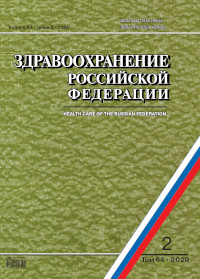On the way to improve the quality of the health potential of the Russians
- Autores: Ivanov O.I.1
-
Afiliações:
- D.Sci. (Philosophy), Professor, Faculty of Sociology, St. Petersburg State University, St. Petersburg, 193060, Russia. E-mail: oliv2002@rambler.ru
- Edição: Volume 64, Nº 2 (2020)
- Páginas: 105-110
- Seção: DISCUSSION
- ##submission.dateSubmitted##: 25.10.2024
- URL: https://hum-ecol.ru/0044-197X/article/view/637528
- DOI: https://doi.org/10.46563/0044-197X-2020-64-2-105-110
- ID: 637528
Citar
Texto integral
Resumo
As a rule, the state of health and the potential of public health is assessed based on the use of biomedical criteria. Today, these assessments need to be supplemented by social criteria, among which one of the most important is the criterion of the active attitude of individuals and communities to their health. The article presents the potential of health as a specific social phenomenon. From our point of view, the potential of health as a social property of individuals and communities has three sources and three components: the needs, abilities and willingness of individuals and communities for years with practical actions to maintain good health (physical and mental) and performance. The formation of developed systems of needs, abilities and willingness of individuals and communities to learn and use health practices is a real way to reduce social inequalities in health. Movement in this direction can lead to a significant increase in the number of Russian citizens who are able to independently solve problems to improve their health in situations that do not require emergency professional assistance. In order to revitalize the population and relevant social institutions in recreational activities, the author proposes to define the year 2021 (or another year) as the year of health.
Sobre autores
O. Ivanov
D.Sci. (Philosophy), Professor, Faculty of Sociology, St. Petersburg State University, St. Petersburg, 193060, Russia. E-mail: oliv2002@rambler.ru
Autor responsável pela correspondência
Email: oliv2002@rambler.ru
ORCID ID: 0000-0003-1593-0131
Bibliografia
- Кляйнеберг М. Болезнь и здоровье в эпоху велнеса, селфтрекинга и самооптимизации — на пути к обществу здоровья? Вестник СПбГУ. Философия и конфликтология. 2018; 34(1): 17-23. DOI: http://doi.org/10.21638/11701/spbu17.2018.102
- Ним Е.Г. Селф-трекинг как практика квантификации телесности: концептуальные контуры. Антропологический форум. 2018; (38): 172-92. DOI: http://doi.org/10.31250/1815-8870-2018-14-38-172-192
- Kickbusch I., Hartung S. Die Gesundheitsgesellschaft. Konzepte fur eine gesundheitsforderliche Politik. Bern: Verlag Hans Huber; 2014.
- Паутов И.С., Паутова Н.И. Продвижение здорового образа жизни как инструмент реализации государственной политики в сфере охраны здоровья в современной России. Журнал исследований социальной политики. 2014; 12(4): 493-508.
- Шабунова А.А. Здоровье населения России: состояние и динамика. Вологда; 2010.
- ВОЗ. Глоссарий терминов по вопросам укрепления здоровья. Женева; 1998.
- Гольман Е.А. Новое понимание здоровья в политике и повседневности: истоки, актуальные направления проблематизации. Журнал исследований социальной политики. 2014; 12(4): 509-22.
- Меренков А.В., Антонова Н.Л., Вандышев М.Н. Лечебно-оздоровительные практики населения в условиях социальной неопределенности. Известия Уральского федерального университета. Серия 3: Общественные науки. 2017; 12(2): 92-8.
- Русинова Л.В., Панова В.В., Сафронов В.В. Социальная стратификация здоровья в Санкт-Петербурге: изменения в период трансформаций. Журнал социологии и социальной антропологии. 2008; 11(4): 102-21.
- Мухарямова Л.М., Кузнецова И.Б. Равенство и справедливость в отношении здоровья: к поиску аналитических инструментов оценки. Журнал исследований социальной политики. 2015; 15(4): 651-9. DOI: http://doi.org/10.17323/727-0634-2017-15-4-651-659
- Kindig D.A., Panzer A.M., Nielsen-Bohlman L., eds. Health Literacy: A Prescription to End Confusion. Washington, DC: The National Academies Press; 2004.
- Сырцова Л.Е., Абросимова Ю.Е., Лопатина М.В. Грамотность в вопросах здоровья: содержание понятия. Профилактическая медицина. 2016; 19(2-1): 58-63. DOI: http://doi.org/10.17116/profmed201619258-63
- Койчуев А.А. Результаты оценки знаний и деятельности врачей первичного звена здравоохранения в сфере медицинской профилактики и формирования грамотности пациентов в вопросах здоровья. Профилактическая медицина. 2012; 16(6): 43-7.
- Иванов О.И. Человеческий потенциал (формирование, развитие, использование). СПб.: Скифия-принт; 2013.
Arquivos suplementares








